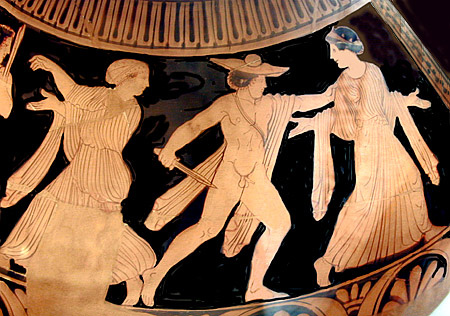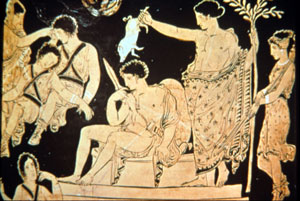
Orestes kills Clytemnestra
Third in a trilogy
The Eumenides is the third of a cycle of three plays written by the Greek playwright Aeschylus.
Who was Aeschylus?
Agamemnon
Curse of Atreus
Greek literature
All our ancient Greece articles
What’s the backstory?
When Orestes kills his mother, Clytemnestra, the Furies (the Eumenides: you-MEN-ih-dees) attack him because he has done such a terrible thing. You might say he begins to go crazy with the horror of what he has done.
Athena says to hold a trial
But the goddess Athena steps in and says that the Furies will not decide this case. Instead, it will be tried in a court of law, and the men of Athens will be the jury.
Apollo speaks for Orestes
The court meets, and each side presents their arguments: was it better to let his father go unavenged, or to kill his mother? The god Apollo speaks to defend Orestes, and the Furies speak against him.
Athena casts the tie-breaking vote

Orestes being purified by Apollo (Eumenides Painter, about 380 BC)
The jury deadlocks, half on each side, but Athena casts the deciding vote that lets Orestes go free. Apollo performs the ceremony that cleans Orestes and makes him able to rejoin society.
Court systems are established
However, in the future, the relatives of murder victims will go to court, and not avenge crimes on their own.
Learn by doing: hold your own jury trial for Orestes. What would you decide?
More Greek plays: Sophocles
Bibliography and further reading about the Eumenides:
Greek Theatre, by Stewart Ross (1999). Easy reading.
Greek and Roman Theater, by Don Nardo. For teenagers.
The Oresteia, by Aeschylus, translated by Robert Fagles (Penguin Classics). The most famous of the plays Aeschylus wrote. Fagles is a great translator! Includes a version for performance.
Aeschylus, by John Herington (1986). A discussion by a specialist about the life of Aeschylus and why his plays are written the way they are.
Greek Tragedy: A Literary Study, by H. D. F. Kitto (reprinted 2002). A classic discussion of the meaning of Greek tragic plays, by a specialist.




